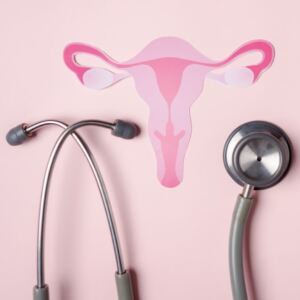Everything You Need to Know About PCOS
What is PCOS?
Polycystic ovary syndrome (PCOS) is the most common disorder of female hormones in women of childbearing age. Researchers estimate PCOS affects at least 7% of adult women (1).
There are limited studies of PCOS in the Nigerian population; however, the research that has been done suggests PCOS is common in Nigerian women who are affected by infertility (2).
PCOS is a complex condition, often including: high androgen levels (a group of sex hormones), irregular menstrual periods, and/or small cysts (fluid-filled sacs) on the ovaries (3).

What Are the Symptoms?
70% of women with PCOS have thick male-pattern body hair (hirsutism), acne, and hair loss (4).
Overall the signs and symptoms of PCOS include (3):
- Enlarged ovaries with cysts
- Infertility
- Irregular menstrual periods (or none at all)
- Hirsutism (Excessive body hair in a male pattern; on the face, back, chest, or buttocks)
- Obesity
- Insulin resistance
- High androgen levels
- Weight gain or trouble losing weight
- Alopecia (hair loss or thinning hair)
- Acanthosis nigricans (dark patches of skin in the armpits or groin)
- Pelvic pain
- Skin tags
What Are the Causes of PCOS?
Researchers do not fully understood the exact cause of PCOS. However, a combination of genetic and environmental factors (e.g. environmental toxins) contribute to its development (5).
Furthermore, PCOS is potentially a result of defects in the hypothalamic-pituitary axis (responsible for certain hormones), insulin resistance, and ovarian dysfunction (6).
Insulin helps to move blood sugar into body cells to give them energy. When the body becomes resistant to the effects of insulin, excess sugar stays in the blood, which prompts the pancreas to make more insulin (7). Therefore, insulin resistance can result in high levels of fasting blood sugar and insulin.
Insulin also plays a role in ovulation. When there is excess insulin in the blood, the ovaries produce more androgens (e.g., testosterone) (6).
As well, women with PCOS typically have high levels of luteinizing hormone (LH) and gonadotropin-releasing hormone (GnRH). In contrast, women with PCOS generally have normal to low levels of follicle-stimulating hormone (FSH) (3). The increase in GnRH causes the hormone-releasing cells of the ovaries to secrete more androgens (8).
Excess androgens can stop the body from ovulating and cause acne, thinning hair, and excess body hair in a male pattern (3).
How Do You Get Diagnosed?
If your doctor suspects that you have PCOS, they can order blood tests, a transvaginal ultrasound, and look for clinical features of PCOS.
The Androgen Excess and PCOS Society (AE-PCOS Society) define PCOS as the following (9):
- Hyperandrogenism (excessive body/facial hair and/or high blood androgen levels), and
- Ovarian dysfunction (infrequent ovulation and/or polycystic ovaries), and
- The exclusion of other conditions of excess androgens
As well, the AE-PCOS Society has updated the criteria for polycystic ovaries to a minimum of 25 follicles of 2-9 mm in size and/or an ovary size of at least 10 mL (10).
What Are the Treatments for PCOS?
Since we do not know the cause of PCOS, health care workers direct treatment at the management of symptoms. Treatment options will depend on the person’s symptoms, their weight, and whether they want to become pregnant.
Treatment goals with PCOS are to (1) reduce the effects of excess androgens, (2) regulate the menstrual cycle, and (3) reduce insulin resistance (3).
Hormonal contraceptives are the first-line treatment for irregular periods for women who don’t want to become pregnant because they regulate periods and reduce androgen levels (10).
If you wants to become pregnant, your doctor may recommend Metformin (Glucophage). This is because Metformin may improve menstrual regularity as well as insulin sensitivity (11). There are also drugs which promote fertility by promoting the secretion of FSH, such as clomiphene (Clomid) and letrozole (Femara) (10).
What Impact Does Diet Have on PCOS?
PCOS is a complex condition that is related to insulin resistance and obesity (3).
Lifestyle changes such as a healthy diet, weight loss, and physical activity may improve the metabolic and reproductive problems associated with PCOS (12).
Weight Loss
Weight loss of 5% or more of starting weight may reduce testosterone and insulin levels, and improve menstrual regularity and fertility (13). As well, weight loss can improve the features of PCOS regardless of the ratio of carbohydrates, fats, and proteins that you eat (14).
Carbohydrates
The type of carbohydrates that you consume is important, and even more so when you have PCOS. Processed carbohydrates, such as white rice, white bread, puff puff, cakes, and pastries, generally have less fibre and nutrients. As well, the body can digest and absorb refined carbohydrates more quickly. Consequently, processed carbohydrates may cause a spike in blood sugar and insulin after eating. Afterwards, the spike may be followed by a dip in blood sugar (a sugar crash) (15).
In contrast, carbohydrate foods that are rich in fibre, such as whole grains (millet, Guinea corn, oats), vegetables, fruits, tubers, and beans can provide a slower release of sugar into the bloodstream (16).
Protein
High protein diets may help increase weight loss, reduce waist circumference, and improve insulin sensitivity in the general population. Therefore, high-protein diets are an area of research for women with PCOS (17–18).
As well, protein can provide more satiety (feeling of fullness) after eating than carbohydrates or fat. If your goal is weight loss, eating more protein may help you eat less and reduce snacking before/after meals.
Fat
Saturated fats may to worsen insulin resistance, while monounsaturated and polyunsaturated fats may improve insulin sensitivity (19).
As well, researchers have found that consuming saturated fat may lead to an increase in inflammation in women with PCOS, regardless of weight (20). In contrast, monounsaturated fatty acids and omega-3 fatty acids are linked to a reduction in inflammation and improved insulin resistance (21–22).

Moi moi is a good source of protein and fibre, making it a great food for PCOS
Takeaway
In conclusion, PCOS is a common hormonal disorder that affects women of childbearing age. Health care workers characterize PCOS by high androgen levels, irregular menstrual periods, and cysts on the ovaries.
Treatment of PCOS is focused on managing the symptoms since we do not fully understand the cause of PCOS. Lifestyle changes such as eating well and exercising may help to improve the metabolic and reproductive issues of PCOS.
There are also several options for medications, such as hormonal birth control, metformin, clomiphene, and letrozole.
If you think you may have PCOS, you should contact your doctor to find out how to best address your concerns.
Are you interested in a custom meal plan created for your unique management of PCOS? Or do you simply want to eat healthier and reach your nutrition and health goals? If yes to either question, then reach out to us via WhatsApp or by using our contact form.

Leave A Comment